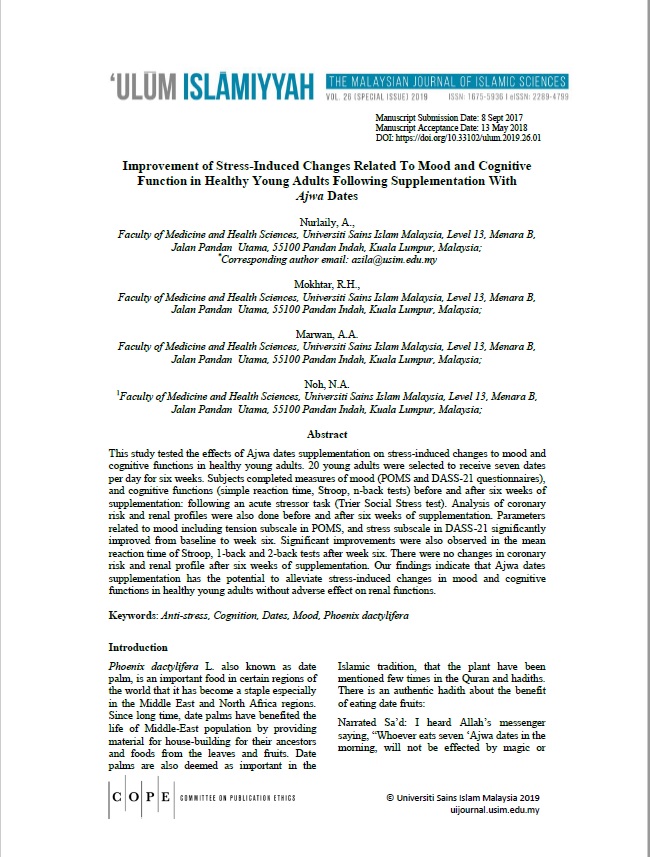Improvement of Stress-Induced Changes Related To Mood and Cognitive Function in Healthy Young Adults Following Supplementation With Ajwa Dates
DOI:
https://doi.org/10.33102/uij.vol26no.111Keywords:
anti-stress, cognition, dates, mood, phoenix dactylifera, ajwa, food, nutrition, ajwa datesAbstract
This study tested the effects of Ajwa dates supplementation on stress-induced changes to mood and cognitive functions in healthy young adults. 20 young adults were selected to receive seven dates per day for six weeks. Subjects completed measures of mood (POMS and DASS-21 questionnaires), and cognitive functions (simple reaction time, Stroop, n-back tests) before and after six weeks of supplementation: following an acute stressor task (Trier Social Stress test). Analysis of coronary risk and renal profiles were also done before and after six weeks of supplementation. Parameters related to mood including tension subscale in POMS, and stress subscale in DASS-21 significantly improved from baseline to week six. Significant improvements were also observed in the mean reaction time of Stroop, 1-back and 2-back tests after week six. There were no changes in coronary risk and renal profile after six weeks of supplementation. Our findings indicate that Ajwa dates supplementation has the potential to alleviate stress-induced changes in mood and cognitive functions in healthy young adults without adverse effect on renal functions.
Downloads
References
Bahri, S. et al., 2007. The Association between risk factors and low back pain among commercial vehicle drivers in peninsular Malaysia: a preliminary result. Industrial Health, 45(2), pp.268–278.
Deary, I.J., Liewald, D. & Nissan, J., 2011. A free, easy-to-use, computer-based simple and four-choice reaction time programme: the Deary-Liewald reaction time task. Behavior research methods, 43(1), pp.258–68.
Eid, N. et al., 2014. The impact of date palm fruits and their component polyphenols, on gut microbial ecology, bacterial metabolites and colon cancer cell proliferation. Journal of nutritional science, 3(22), p.e46.
El Hadrami, A. et al., 2012. Socioeconomic and traditional importance of date palm. Emirates Journal of Food and Agriculture, 24(5), pp.371–385.
Hadith. Al-Bukhari. Sahih Bukhari : Book 76: #91
Harris, E. et al., 2011. The effect of multivitamin supplementation on mood and stress in healthy older men. Human Psychopharmacology, 26(8), pp.560–567.
Ishurd, O. & Kennedy, J.F., 2005. The anti-cancer activity of polysaccharide prepared from Libyan dates (Phoenix dactylifera L.). Carbohydrate Polymers, 59(4), pp.531–535.
Kawabata, K., Kawai, Y. & Terao, J., 2010. Suppressive effect of quercetin on acute stress-induced hypothalamic-pituitary-adrenal axis response in Wistar rats. Journal of Nutritional Biochemistry, 21(5), pp.374–380.
Kirschbaum, C., Pirke, K.M. & Hellhammer, D.H., 1993. The “Trier Social Stress Test” - A tool for investigating psychobiological stress responses in a laboratory setting. Neuropsychobiology, 28(1–2), pp.76–81.
Lee, Y.C. & Winston, F.K., 2016. Stress induction techniques in a driving simulator and reactions from newly licensed drivers. Transportation Research Part F: Traffic Psychology and Behaviour, 42, pp.44–55.
Nurlaily, A. et al., 2016. Phoenix Dactylifera (Date Fruits) Administration to Animal Models Of Neurological Diseases: A Systematic Review Of Health Benefits. Current Topics in Nutraceutical Research, 14(3), pp.181–190.
Pujari, R.R., Vyawahare, N.S. & Thakurdesai, P. a., 2014. Neuroprotective and antioxidant role of Phoenix dactylifera in permanent bilateral common carotid occlusion in rats. Journal of Acute Disease, 3(2), pp.104–114.
Rahmani, A.H. et al., 2014. Therapeutic effects of date fruits (Phoenix dactylifera) in the prevention of diseases via modulation of anti-inflammatory, anti-oxidant and anti-tumour activity. International Journal of Clinical and Experimental Medicine, 7(3), pp.483–491.
Shakibaa, M., Kariminikb, A. & Parsia, P., 2011. Antimicrobial Activity of Different Parts of Phoenix dactylifera. International Journal of Molecular and Clinical Microbiology, 1, pp.107–111.
Shansky, R.M. & Lipps, J., 2013. Stress-induced cognitive dysfunction: hormone-neurotransmitter interactions in the prefrontal cortex. Frontiers in Human Neuroscience, 7.
Shields, G. S., Bonner, J. C., & Moons, W. G. (2015). Does cortisol influence core executive functions? A meta-analysis of acute cortisol administration effects on working memory, inhibition, and set-shifting. Psychoneuroendocrinology, 58, 91–103.
Subash, S. et al., 2014. Effect of dietary supplementation of dates in Alzheimer’ s disease APPsw / 2576 transgenic mice on oxidative stress and antioxidant status. , 0(0), pp.1–8.
Vogel, S. et al., 2016. Cognitive Adaptation under Stress: A Case for the Mineralocorticoid Receptor. Trends in Cognitive Sciences, 20(3), pp.192–203.
WHO, 2017. Depression and other common mental disorders: global health estimates. World Health Organization, pp.1–24.
Yabe, T. et al., 2010. Ferulic acid induces neural progenitor cell proliferation in vitro and in vivo. Neuroscience, 165(2), pp.515–524.
Yahya, H.M. et al., 2017. Mood, cognitive function and quality of life improvements in middle aged women following supplementation with polygonum minus extract. Sains Malaysiana, 46(2), pp.245–254.
Zeni, A.L.B. et al., 2012. Ferulic acid exerts antidepressant-like effect in the tail suspension test in mice: Evidence for the involvement of the serotonergic system. European Journal of Pharmacology, 679(1–3), pp.68–74.

Downloads
Published
How to Cite
Issue
Section
License
If the article is accepted for publication, the copyright of this article will be vested to author(s) and granted the journal right of first publication with the work simultaneously licensed under the Creative Commons Attribution-NonCommercial 4.0 International License, unless otherwise stated. Anyone may reproduce, distribute, translate and create derivative works of this article (for both commercial and non-commercial purposes), subject to full attribution to the original publication and authors. The full terms of this licence may be seen at https://creativecommons.org/licenses/by-nc/4.0/.






